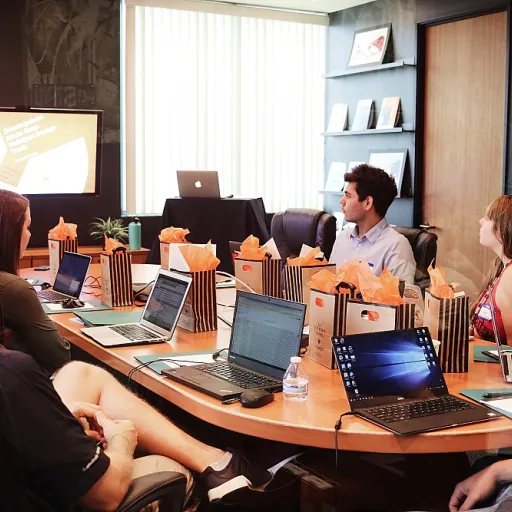
Understanding the Mentoring Landscape
Exploring the Varied Dynamics of Mentoring
The mentoring landscape encompasses diverse forms and functions, extending far beyond the traditional one-on-one guidance that many associate with mentoring relationships. In contexts like academic settings, workplace environments, and youth development programs, mentoring has evolved to meet unique needs and goals. This dynamic field supports various objectives, such as advancing career development, fostering youth academic success, and enhancing personal and professional growth.
Mentoring relationships are commonly initiated to achieve specific goals, such as career advancement or improved academic performance. In workplaces, employees may engage with mentors to target long-term career aspirations, enhancing their potential through structured goal setting and support. Meanwhile, in educational settings, mentors help students and college students—whether through formal mentoring programs or more informal mentor-mentee connections—navigate their academic journeys toward desired outcomes.
Beyond individual growth, a study of mentoring reveals its broader impact on organizational and community success. Effective mentoring partnerships can boost mental health by providing mentees with essential support networks. Moreover, these relationships can bridge generation gaps, as seen in reverse mentoring, where younger individuals offer fresh insights to seasoned professionals.
To truly understand the reality of mentoring, one must recognize the importance of time spent nurturing these connections, as meaningful bonds are crucial to achieving fruitful outcomes. By embracing diverse relationship forms, mentorship programs can build confidence and equip mentees with tools essential to their personal and professional journeys.
For more insights on evaluating mentoring outcomes, including innovative methods like AI coaching, you can explore this resource.
The Benefits of Effective Mentoring
The Positive Ripple Effects of Mentorship
Mentorship, when effectively executed, offers a myriad of benefits that extend beyond the immediate mentor-mentee dynamics. Among these advantages, career development stands as a central pillar. Practical advice provided by mentors helps mentees navigate workplace challenges, set achievable goals, and align their career trajectories with long-term personal and professional aspirations. This guidance not only enhances career success but also promotes academic excellence, particularly for college students and youth embarking on new career paths.
Moreover, mentors act as role models, offering a steady source of support and direction that can be pivotal in building confidence among mentees. This confidence can significantly impact mental health, fostering a sense of clarity and purpose which is invaluable in both academic and professional settings. The supportive environment created through mentoring relationships not only aids students in their studies but also prepares them for the realities of post-college careers.
Beyond individual benefits, effective mentoring plays a crucial role in organizational outcomes. By cultivating strong mentor-mentee relationships, companies can enhance workplace morale, boost employee satisfaction, and ultimately increase productivity. The positive feedback loop created through a well-structured mentoring program can lead to improved retention rates and the cultivation of future leaders within the organization.
Thus, mentoring serves as a vital tool in goal setting and personal development. In the ever-evolving landscape of talent management, recognizing the broad-reaching impacts of mentorship provides a foundation for fostering growth, not only for the mentees but also for mentors and the organizations they belong to.
Challenges in Mentoring Relationships
Recognizing the Hurdles of Mentorship
Effective mentoring is undeniably beneficial, but fostering successful mentoring relationships can present several challenges. Identifying these barriers is crucial for both mentors and mentees to achieve meaningful career development outcomes. Firstly, the lack of time spent between mentors and mentees often hampers the relationship. In the modern workplace, professionals juggle numerous responsibilities, leaving limited time for mentoring sessions. This situation demands strategic time management to facilitate nurturing mentorships. Building confidence in new or ongoing mentoring relationships is another frequent challenge. Mentees, especially youth or college students, may initially struggle to open up about their personal and professional goals. Conversely, mentors may find it daunting to balance encouraging growth while constructively critiquing mentees. Expectations misalignment is another hurdle to overcome. Mentors and mentees might have different definitions of success or goal setting processes. Clarifying these expectations early aids in establishing a strong relationship and ensures both parties work towards common outcomes. Lastly, maintaining a connection beyond initial engagements presents a significant struggle in long-term mentoring programs. Ensuring ongoing commitment from both sides requires continuous effort to nurture the mentorship bond simply. To delve deeper into overcoming these challenges, visit the Talent Management Institute for insights on team management for optimal performance.Strategies for Successful Mentoring
Unlocking the Path to Successful Mentorship
Embarking on a mentoring journey with clear strategies can significantly enhance both personal and professional outcomes for mentors and mentees. A well-structured approach to this relationship facilitates growth, development, and lasting impact, regardless of the mentee's stage in life, whether they're navigating college, the workplace, or specific career pathways.
First, setting clear goals is pivotal. Mentors and mentees should collaboratively establish specific, measurable, attainable, relevant, and time-bound (SMART) objectives. This goal setting lays a foundational roadmap for the mentoring relationship, allowing both parties to understand and track progress. It also keeps the focus aligned with the mentee's personal and academic success aspirations, ensuring mentoring relationships remain productive.
The commitment to regular interaction is another critical component. Time spent together not only fosters trust but also deepens the mentor-mentee connection, making room for communication that's both open and honest. Building such relationships offers students a safe space to discuss challenges they face in their academic or career development journey, ultimately supporting mental health and building confidence.
Moreover, mentors should strive to adopt a supportive and flexible approach tailored to the mentee’s needs, whether they are college students gearing toward career exploration or youth aiming for academic improvement. Understanding the reality that each mentee's background differs ensures that advice and support are personalized and actionable.
In turn, this sets a stage where reverse mentoring can occur, allowing mentors to learn from their mentees. This exchange fosters an enriching environment of shared learning and growth.
Lastly, ensuring the mentoring program is structured with regular feedback loops can significantly impact outcomes. Feedback helps continuously refine the mentorship approaches and enables the identification of areas needing adjustment, ensuring long-term success.
By implementing these strategies, both mentors and mentees can create a dynamic mentoring relationship that not only achieves goals but also inspires personal and professional transformation.
The Role of Technology in Mentoring
The Intersection of Technology and Mentoring Dynamics
In today's fast-paced, digitally-driven world, technology plays a pivotal role in shaping mentoring relationships. As we delve deeper into the mentoring landscape, it's crucial to understand how digital tools can enhance the classic mentor-mentee dynamic. These advancements serve not only to facilitate communication but also to enrich the mentoring experience for both parties. Platforms dedicated to mentoring programs have emerged, providing structured environments where mentors and mentees can set clear goals and track progress. These tools are particularly beneficial in corporate settings, where workplace mentoring supports employees in their career development—be it through reverse mentoring or traditional mentorship models. Technology also plays a significant role in youth mentoring and academic success. College students, for example, can leverage virtual platforms to connect with industry professionals who can provide valuable insights into achieving long-term career goals. The ease of access and flexibility afforded by digital communication enables college mentoring programs to offer continuous support and guidance. Social media and messaging apps have contributed to maintaining relationships between mentors and mentees, making it easier to provide real-time support and foster closer personal and professional connections. Studies show that consistent communication has a positive impact on the outcomes of mentoring relationships, driving both academic and career success. By integrating digital tools, mentoring programs have the potential to become more dynamic and inclusive, offering support tailored to the unique needs of each mentee. While technology promises to transform mentoring, it is essential to remember the core elements that underpin these relationships—trust, commitment, and mutual goal setting. In navigating these new digital terrains, mentors and mentees must balance virtual interactions with the time spent cultivating genuine, personal connections. This balance is key in maximizing the benefits that technology brings to mentoring relationships. The reality is that while technology offers innovative ways to facilitate mentorship, the fundamental aspects of the relationship mentor and mentee share remain critical. As technology continues to evolve, it is crucial for mentoring programs to adapt, ensuring that technology is leveraged effectively to support both academic and workplace success.Future Trends in Mentoring
Mentorship's Evolution: Embracing New Directions
The landscape of mentoring is continuously evolving, shaped by various elements that influence both the participants and the methodologies involved. As we delve into the future of mentorship, we need to acknowledge that changes in technology, societal needs, and career development priorities are reshaping how we approach mentoring relationships.One of the most significant developments is the integration of technology in mentoring programs. Digital platforms are transforming traditional face-to-face interactions by offering virtual mentorship opportunities. This shift allows for more flexible scheduling, which is particularly beneficial for busy college students and working professionals. It also broadens the pool of available mentors and mentees, fostering diverse perspectives and enhancing the mentoring relationship.
With the growing emphasis on career development, mentoring strategies are increasingly geared towards supporting mentees in navigating a complex job market. The role of mentors has expanded beyond providing academic assistance to include guidance on personal and professional goal setting, building confidence, and mental health support. This holistic approach addresses both the immediate and long-term needs of mentees, contributing to their overall success.
The concept of reverse mentoring is gaining traction as well. In this dynamic, younger employees or students mentor their more experienced counterparts, typically in areas like technology or contemporary cultural trends. This reciprocal learning process enriches the workplace environment, fostering mutual understanding and enhancing outcomes for all participants.
Moreover, as awareness about the importance of diversity and inclusion grows, organizations are taking steps to implement more inclusive mentoring programs. These initiatives aim to ensure that all individuals, regardless of their background, have access to mentors who can support and advocate for their career aspirations and personal goals.
The realities of mentoring are constantly reshaped by these emerging trends. By staying attuned to these developments, mentors and organizations can better equip themselves to meet the changing needs of their mentees, paving the way for successful mentoring relationships that drive personal and professional growth.













